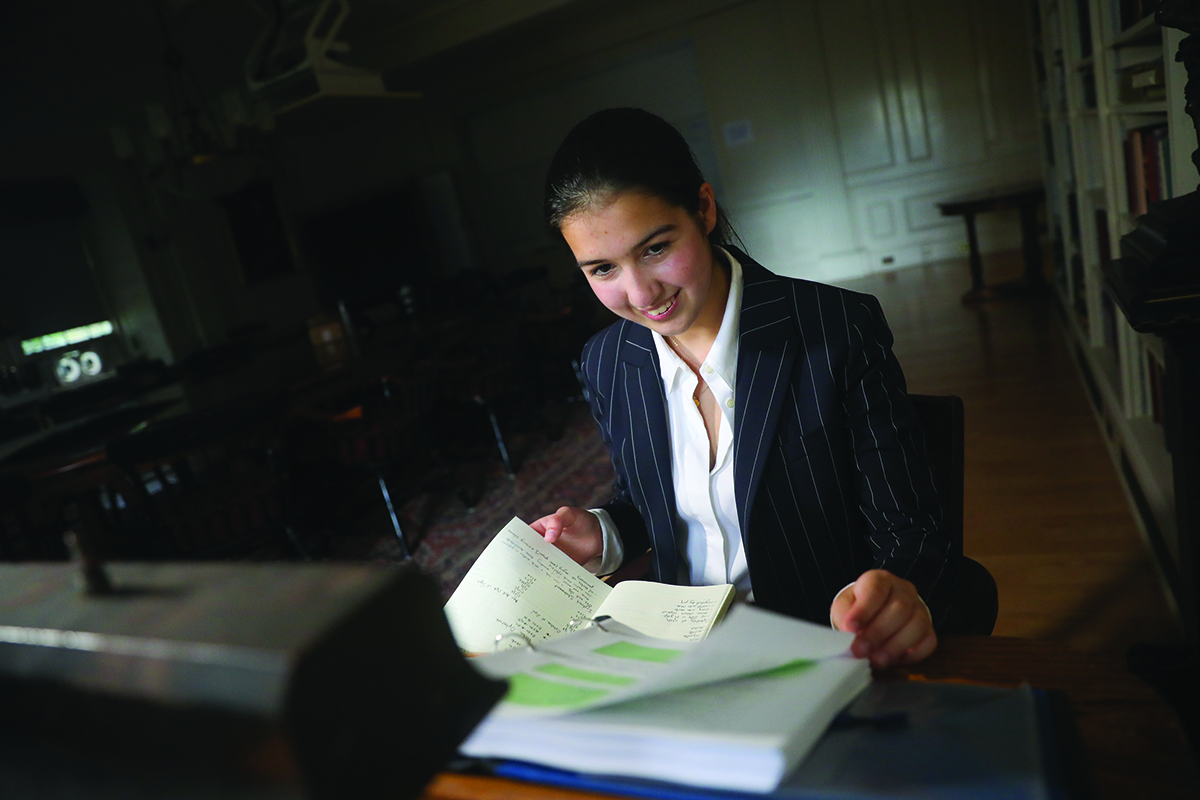Emma Finn ’22: Classical Language Whiz

Emma Finn ’22 started taking Latin in sixth grade and chose to come to Exeter in part to continue her studies. In pursuit of a Classics diploma, she enrolled in her first Greek course during her upper year and was immediately hooked. “I love Latin, but for me Greek is a more fluid language,” Finn says. “There are these little words called particles that can convey sarcasm and nuance in away you can only really get while speaking in English.”
When Finn heard that Matthew Hartnett, chair of the Department of Classical Languages, was looking for a student to work remotely over the summer to revise ΑΓΩΝ (pronounced “ahg-own”), the ancient Greek textbook he wrote that is used in Exeter’s introductory Greek courses, she jumped at the opportunity. “My goal for the project was not just to make it easier to learn, but to make people really fall in love with the language the way I did,” she says.
In addition to reformatting the appendix, indexing prepositions and other tasks, Finn added new sentences to the textbook to ensure better distribution of vocabulary words. She particularly enjoyed researching and writing short biographies of the authors whose texts are included in the book, hopefully inspiring her fellow Greek scholars to read more of their work.
“It’s been great practice to see the curriculum and the material through a different lens,” she says. “I’ve always loved storytelling, and it’s been really rewarding to shift from being a consumer of knowledge to being able to produce it in ways that will have an impact on other students’ learning.”
“Emma came up with a lot of ways to make learning the vocabulary and grammar easier, including little mnemonic devices, tricks and tips,” Hartnett says. “Because she can still see Greek through a student’s eyes, she helped us present the material in a way that’s easier for students to understand.”
Finn’s academic interests also led her to Exeter History Instructor Aykut Kilinc, who enlisted her help in designing lesson plans and curriculum for his economics course. “We read this really interesting book that’s basically a comprehensive history of U.S. trade policy,” she says. “Which I know doesn’t sound interesting, but it turns out to be a great way of looking at the broader political shifts in the United States over time.”
On top of those two projects, Finn found time to complete a summer internship for the New York Historical Society. Working remotely from her home in Maryland, she wrote a blog post about the pioneering female journalist Ruth Hale for the museum’s Center for Women’s History and helped develop lesson plan content for Museums for Digital Learning, an educational platform that provides K-12 schools with curated resources.
For her academic excellence, Finn was recently selected as a Coolidge Scholar, an honor that comes with a scholarship for four years of undergraduate study at any accredited college or university in the United States. Coolidge Scholars are also selected based on a demonstrated interest in public policy and a record of humility and service. In Finn’s case, she has been involved in the Exeter Student Service Organization since her prep year and is now the co-president. She’s also co-head of Exeter’s Economics Club and Microfinance Club, which provides small loans to entrepreneurs in the developing world.
Before the pandemic, Finn frequently volunteered to care for abandoned horses at the Hidden Pond Equine Rescue in Brentwood, New Hampshire. “The goal is to socialize the horses and get them used to being around humans again so they can be adopted,” Finn says. An experienced equestrian who started riding when she was 6 years old, Finn competed in horse shows on weekends during her lower year and hopes to resume riding and volunteering with horses during the new school year.